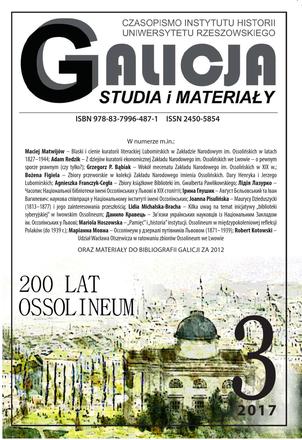From the history of economic curatorship of the Ossolineum in Lviv – about a certain legal conflict (or is it only that?)
DOI:
https://doi.org/10.15584/galisim.2017.3.2Keywords:
Zakład Narodowy im. Ossolińskich, Lwów, kuratoria ekonomiczna, Ledóchowscy, dziecko nieślubne, dziecko legitymowane, spór sądowyAbstract
This article concerns the conflict about economic curatorship of the Ossolineum in Lviv aften the death of Michał Baier (1930). Two representatives of the Ledóchowski family – Mieczysław and Stanisław were involved in this conflict. This conflict went through all degrees of jurisdiction and lasted from 1931 to 1937. Its essence was estimating whether the priority to take over the post of economic curator belonged to – according to principles set by Józef Maksymilian Ossoliński – the male representative of the indicated family appointed in the process of establishing primogeniture if he was an illegitimate child, later legitimized by the marriage of the father and the mother. The course of events and arguments raised by its participants allow to express doubts whether this conflict was only a legal one or rather a family-moral one. The courts had to consider the rights of legitimate children several times. Although they finally granted the priority to Stanisław Ledóchowski accepting his rights as a legitimate child through the marriage of the mother with the biological father later on, the right to take economic curatorship of the Ossolineum – due to procedural reasons – was granted to his rival. The history of the economic curatorship of the Ossolineum presented in this article has not yet been dealt with in the literature on the Ossolineum.
Downloads
References
Zakład Narodowy im. Ossolińskich we Wrocławiu (ZNOss): ZNOss, Dział Rękopisów (Manuscripta Instituti Ossoliniani), sygn. III 13766 – Sprawa kuratorii ekonomicznej Zakładu Narodowego im. hr. Ossolińskich; ZNOss, Dział Rękopisów (Manuscripta Instituti Ossoliniani), sygn. II 13311.
Austriacki Kodeks Cywilny z 1811 r. – Allgemeines Bürgerliches Gesetzbuch, w skrócie ABGB z 1 czerwca 1811 r., obowiązuje od 1 stycznia 1812 r.
Kodeks Cywilny Królestwa Polskiego z 1825 r. – Kodex Cywilny Królestwa Polskiego – w Warszawie dnia 1 (13) Czerwca 1825 r., „Dziennik Praw Królestwa Polskiego” 1825, tom X, nr 41.
Ustawy Zakładu Narodowego imienia Ossolińskich, Lwów 1935.
Zakładu Narodowego imienia Ossolińskich ustawy, przywileje i rzeczy dziejów jego dotyczące, zebrał i wydał W. Bruchnalski, Lwów MCMXXVIII [1928].
Allerhand M., Glosa do wyroku SN z 19 kwietnia 1937 r., „Głos Prawa” 1937, nr 5–6, s. 301–309.
Gałyga M., Status Zakładu Narodowego im. Ossolińskich w okresie zaborów i w latach międzywojennych, „Czasopismo Zakładu Narodowego imienia Ossolińskich” 1992, t. 1, s. 21–44.
Ledóchowski M., …aby pozostał nasz ślad: dzieje rodu Ledóchowskich, Towarzystwo Przyjaciół Ossolineum, Wrocław 2002.
Matwijów M., Mieczysław Gębarowicz 1893–1984, Ossolineum, Wrocław 2013.
Matwijów M., Zakład Narodowy im. Ossolińskich w latach 1939–1946, Ossolineum, Wrocław 2003.
Minakowski M.J., Genealogia potomków Sejmu Wielkiego, http://www.sejm-wielki.pl/b/14.63.171
Orzeczenie Sądu Najw. w przedmiocie prawa kuratorii Zakładu Narodowego im. Ossolińskich we Lwowie, „Głos Prawa” 1937, nr 5–6, s. 294–311; osobna nadbitka: Lwów 1937.
Portrety ossolińskie. Antologia wspomnień, wybrał, opracował i biogramami opatrzył E. Adamczak, Wrocław 1992.
Rappé W.E., Systemy nadzoru nad fundacjami w ustawodawstwie obowiązującem na ziemiach Polski w świetle prawa porównawczego, Lwów 1933.
Downloads
Published
How to Cite
Issue
Section
License
Copyright (c) 2017 Galicja. Studia i materiały

This work is licensed under a Creative Commons Attribution-NonCommercial-NoDerivatives 4.0 International License.



